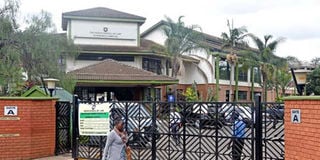Uncertainty stalks KSL decentralisation, liberalisation despite Cabinet approval

The Kenya School of Law academics complex in Nairobi. MEDIA GROUP
There is uncertainty over the structure of the proposed decentralisation and liberalisation of the Advocates Training Programme (ATP), currently only offered by the Kenya School of Law (KSL).
A Cabinet meeting chaired by President Uhuru Kenyatta last month approved two draft bills that will be presented to the National Assembly to kick start the process that would see other institutions licensed to offer the pre-bar training now only available at the Karen campus.
The dilemma is over who will provide the training since it remains unclear whether the other institutions will be private, universities in regions or new campuses of the KSL.
Questions also abound as to the nature of the other institutions.
Will they be independent or domiciled at schools of law at universities?
Spirit of devolution
According to a dispatch from the Cabinet, the decision was made “so as to address challenges occasioned by large number of students undertaking the mandatory post-graduate programme only at the KSL”.
Contrary to perception, the process will also take longer and will involve restructuring the KSL and the Council for Legal Education (CLE) to align their functions.
“It is by no means a done deal even though the Cabinet support is there,” KSL Director Henry Mutai told Higher Education.
“We are in an election period and I am not sure there will be sufficient time for these bills to be passed and enacted.”
Mutai added that the school is not overwhelmed by numbers.
In the last 10 years, its enrolment has never gone beyond the 2,067 students in the 2016/17 academic year, he added.
The decision will require a change in the law to give authority to the CLE authority to license other providers to offer the ATP.
Law graduates are required to undergo the ATP before being admitted to the bar.
They will sit examinations to be administered by the CLE at the end of the training.
As a regulator, it is also the mandate of the council supervise legal education providers and ensure quality assurance.
“The KSL (Amendment) Act is aimed at streamlining the admission requirements so that they are found in one place rather than as they are in the KSL Act and the Legal Education Regulations, which has caused all sorts of problems in terms of admitting applicants to the school,” Dr Mutai said.
He added that decentralisation is in line with the spirit of devolution, which has seen many public services taken to counties.
“Decentralisation is meant to take services close to the people. In the next strategic plan (2022/23 – 2027/28), KSL aims to establish two campuses outside Nairobi county. Their locations will be determined by feasibility studies the school plans to undertake,” he said.
CLE Chief Executive Wambua Kituku said the council has been seeking to decentralise the ATP examinations and that it has already administered the tests from Kabarak University.
He added that while access to the training is enhanced, quality must be ensured.
Improving services
“Competition brings a race towards improving services. This must be done in a way that ensures it is sustainable and we don’t have a situation like the universities where after opening campuses right, left and centre, some have had to be closed as they are not sustainable,” he said.
Dr Kituku added while it presents an opportunity for the council, the process of accrediting other stakeholders must be supported by data to establish the need or demand for the service in particular regions.
According to CLE chief executive, while universities stand out as potential providers, other middle-level colleges should be considered.
He disclosed that CLE is in the process of reviewing the ATP curriculum and that the proposed liberalisation gives the council a chance to test the syllabus under different settings.
“With more ATP centres of excellence, we can be in the position to attract students from other regions,” he said.
“There is a challenge that advocates from the East African Community can practise in Kenya but the converse is not true.”





